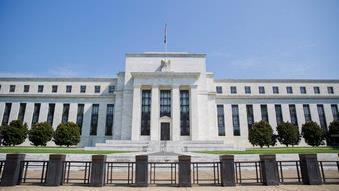Fed hikes interest rates for fourth time this year, despite Trump pressure
The Federal Reserve on Wednesday raised short-term interest rate for the fourth time this year, but signaled a slower pace of gradual rate hikes next year, expecting to hit neutral by the end of 2019.
As expected, policymakers at the central bank said they voted to hike the benchmark federal funds rate by a quarter percentage point, setting a range of 2.25 percent to 2.5 percent.
Wall Street and investors were closely watching the Fed’s announcement after Chair Jerome Powell struck an optimistic note about the state of the U.S. economy in November, suggesting that interest rates are nearing neutral.
"The Fed continues to see that the economy has been continuously surpassing expectations throughout year, with exceptional job growth rates month after month in a labor market that has had very little slack, which demonstrates just how healthy it is," said Steve Rick, chief economist at CUNA Mutual Group. He noted the fourth hike was "not at all surprising."
The policymakers anticipate interest rates will hit neutral by the end of 2019, but suggested there would be one more hike in 2020 before holding steady.
"There's a fairly high degree of uncertainy," Powell said about the future of further rate hikes during his quarterly press briefing. He noted, however, that rates have arrived effectively at the lower-end range of neutral.
Although still low by historical standards, this latest hike put interest rates at the highest level in nearly a decade. It marks the ninth time the Fed has raised interest rates since 2015.
Higher rates can impact consumers by increasing borrowing costs, which have already climbed this year. Auto loan rates are at a nine-year high, and 30-year-fixed mortgage rates climbed to their highest level in seven years.
The Federal Open Market Committee cooled their view of the U.S. economy heading into next year. Although it now expects gross domestic product (GDP) , or economic growth, to hit 3 percent this year, it projected that would fall to 2.3 percent in 2019.
"That is still above the long-run average and should create conditions for at least two additional interest rate increases in 2019," Rick said.
Not everyone agreed, however: Curt Long, the chief economist at the National Association of Federally-Insured Credit Unions, warned that two rate hikes in 2019 could be too many.
"The labor market is strong and the economy is still on solid footing," he said, "But given the risks from trade, housing, Brexit and slowing growth abroad, even a forecast of two rates hikes seems mildly ambitious."
President Trump has repeatedly lambasted Powell and the Fed for what he says is raising interest rates too frequently. Although interest rates can stave off inflation and prevent the economy from overheating, they can also slow it.
"So far, I’m not even a little bit happy with my selection of Jay," Trump said in November during an interview with The Washington Post. ”Not even a little bit. And I’m not blaming anybody, but I’m just telling you I think that the Fed is way off-base with what they’re doing.”
Powell, who has not responded publicly to the attacks, said on Wednesday that political considerations played "no role" in setting monetary policy.
The next FOMC meeting is scheduled to take place at the end of January. Powell will begin holding a press conference after every central bank meeting, starting next year.




















